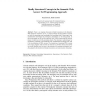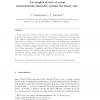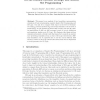3571 search results - page 37 / 715 » Cohen and Set Theory |
CI
2004
13 years 7 months ago
2004
We present a general approach for representing and reasoning with sets of defaults in default logic, focussing on reasoning about preferences among sets of defaults. First, we con...
RSKT
2010
Springer
13 years 6 months ago
2010
Springer
A naive Bayesian classifier is a probabilistic classifier based on Bayesian decision theory with naive independence assumptions, which is often used for ranking or constructing a...
ESWS
2005
Springer
14 years 1 months ago
2005
Springer
There is an ongoing discussion whether reasoning in the Semantic Web should be monotonic or not. It seems however that the problem concerns not only the reasoning over knowledge bu...
FSS
2007
13 years 7 months ago
2007
In the previous years some authors have been elaborating on the measurementtheoretic foundations of fuzzy set theory. A well-known problem in this approach is the difficult applic...
JELIA
2004
Springer
14 years 29 days ago
2004
Springer
This paper is an analysis of two knowledge representation extensions of logic programming, namely Answer Set Programming and ID-Logic. Our aim is to compare both logics on the leve...



